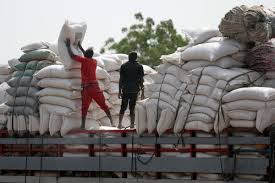In a bid to tackle soaring inflation in Africa’s most populous nation, Nigeria is considering suspending import duties on staple foods, drugs, and other essential items for six months, according to a document seen by Bloomberg.
The proposed “Inflation Reduction and Price Stability Order,” which has been sent to President Bola Ahmed Tinubu for consideration, aims to ease the cost of living for Nigerians by waiving levies on items such as fertilizers, poultry feed, flour, and grains.
“The government may also waive levies on fertilisers, poultry feed, flour and grains,” the document states, as reported by Bloomberg.
This move comes as Tinubu, who completed a year in office on May 29, faces mounting pressure to address the surging cost of living in Nigeria. Inflation accelerated to 33.7 percent in April, the fastest pace in 28 years, prompting the central bank to raise interest rates to a record high.
Previous attempts by the government to control price hikes have yielded limited results. In an effort to get its finances in order, the administration plans to stop borrowing from the central bank through so-called ways and means advances, according to the document.
The report added, “The Inflation Reduction and Price Stability Order will require the Ministry of Finance and the Central Bank of Nigeria (CBN) to come up with a plan to provide low-interest loans to the agriculture, pharmaceutical and manufacturing sectors.”
The document states, “This productive deployment will ultimately improve outputs and reduce inflation.”
In addition to suspending import duties, the proposal includes the suspension of value-added tax (VAT) on automotive gas oil or diesel, some basic food items, semi-processed staple food items like noodles and pasta, raw material inputs for food manufacturing, electricity and public transportation, as well as agricultural inputs, produce, and pharmaceutical products for the remainder of the year.
A government spokesman declined to comment, as the president had not yet signed the document.
Nigeria, where at least 40 percent of more than 200 million people live in extreme poverty, has struggled to control price gains after Tinubu ordered policies to allow the naira to trade more freely and remove fuel subsidies. A threefold increase in electricity tariffs, high food costs, and a 39 percent depreciation in the naira this year have contributed to the inflationary pressures.
The proposed measures aim to provide relief to Nigerians grappling with the rising cost of living and stabilize prices by reducing import costs and promoting domestic production across key sectors

























